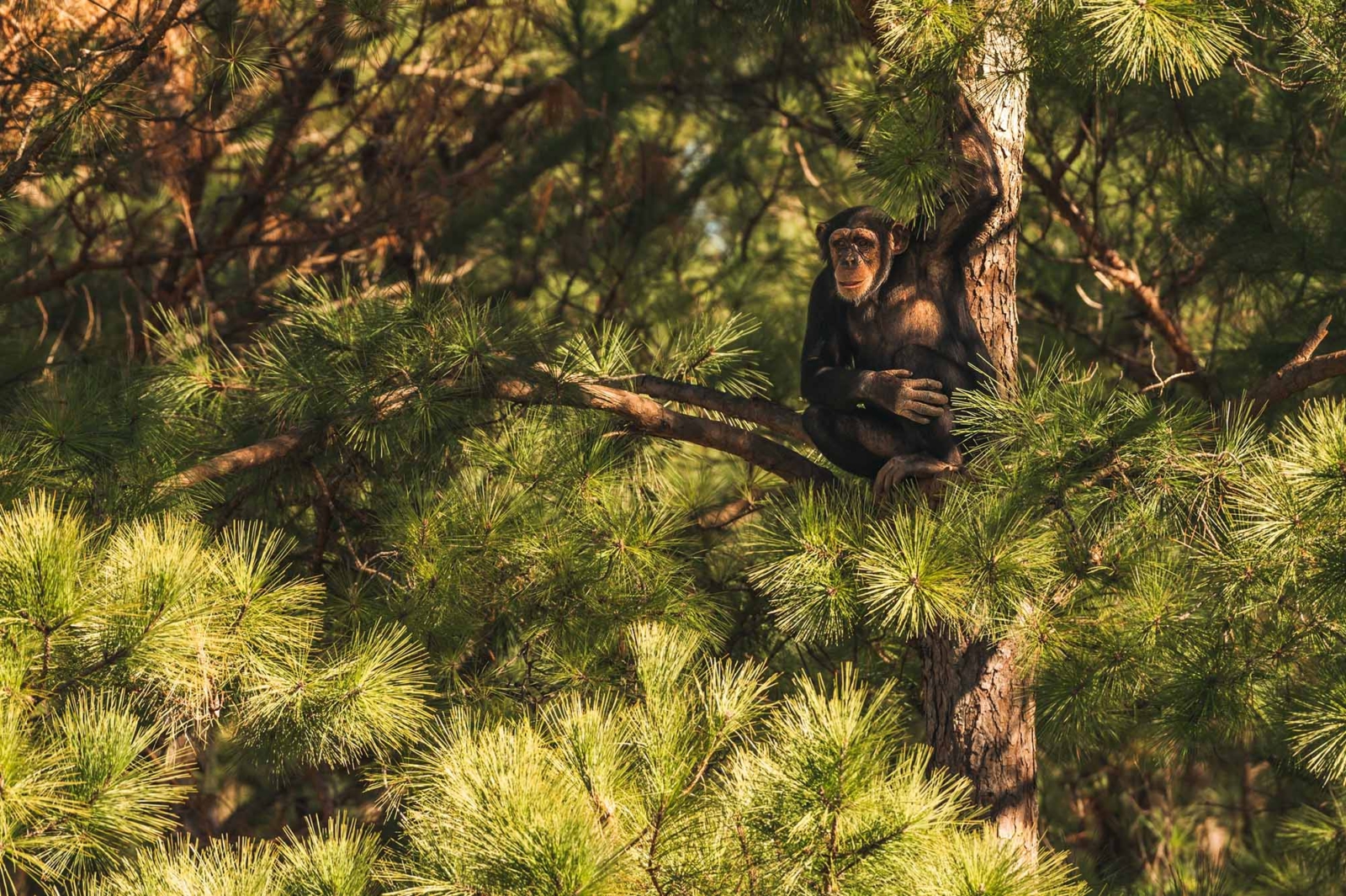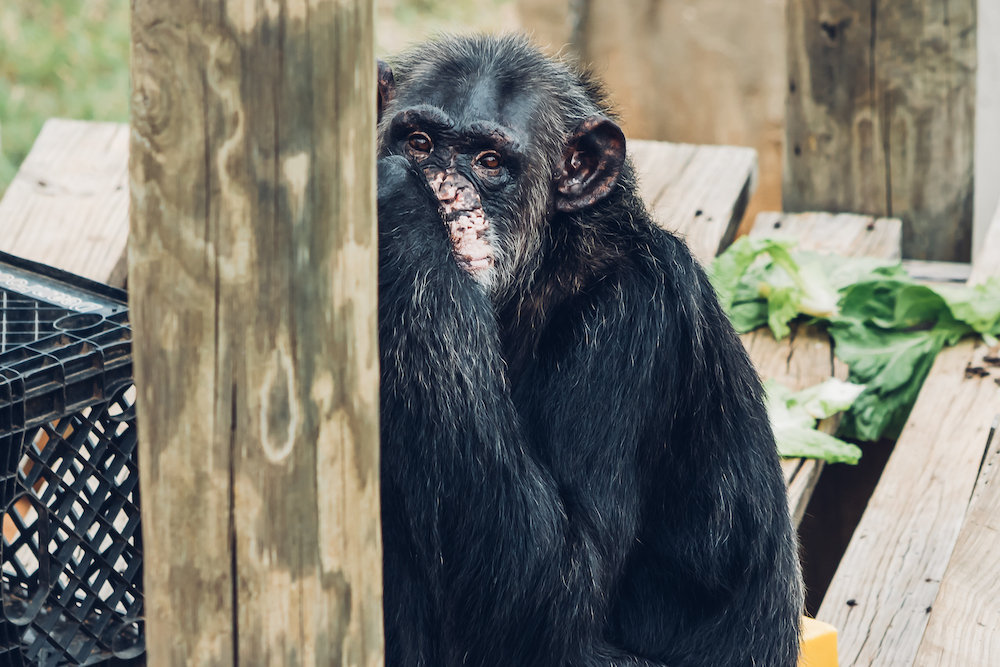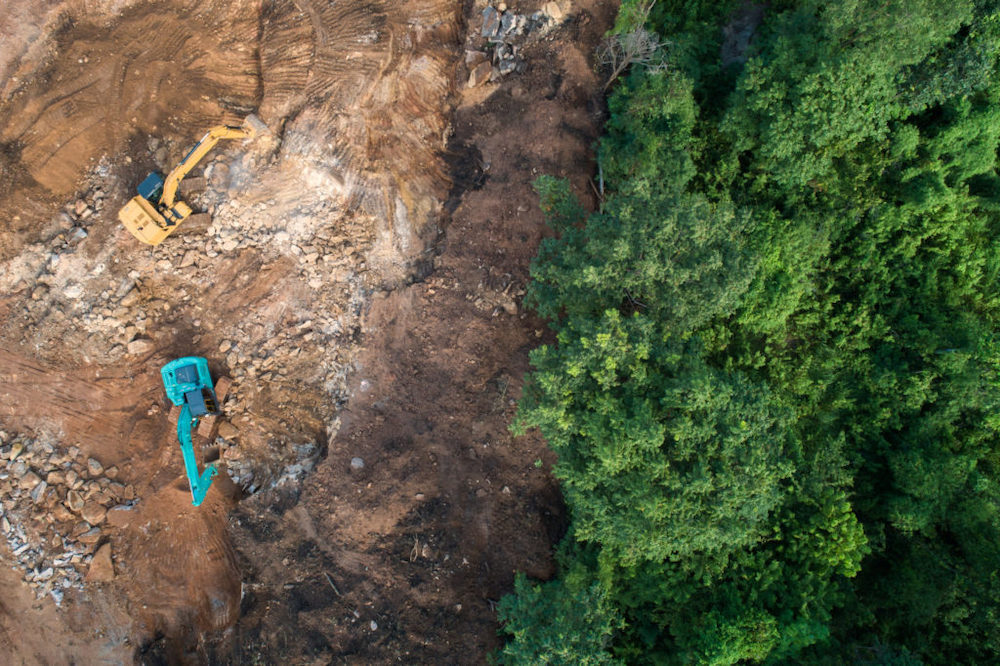
All gifts matched this July!
Help stock the sanctuary for the summer – all donations are doubled! (Up to $15,000)
Let’s Do Our Part
By learning about the issues contributing to the decline of chimpanzees in the wild, we can help conserve the chimps’ natural habitats and protect the species at large.


Where are chimpanzees today?
Wild chimpanzees are currently found in only 21 countries in equatorial Africa. Since 1960, chimpanzee populations have declined by half, with just 150,000 chimpanzees remaining in Africa today, and numbers dwindling daily.
Habitat Loss
The loss of chimpanzee habitats in Africa is primarily related to logging, hunting, mining, and infectious diseases.

Logging activity in the chimps’ natural habitats often removes trees that are important food sources and that the chimps use to self-medicate or treat ailments. Logging also increases the incidence of fire, creates access points for hunters, and splits up chimpanzee territories and populations by creating roads that the chimps are unwilling or unable to cross.
In the wild, chimpanzees are hunted for a variety of reasons:
They may be hunted to be eaten by locals, killed to feed workers in the logging industry, or exported as bushmeat (the meat of wild animals). Chimpanzees may also be seen as pests by farmers, and therefore hunted to prevent them from raiding crops.
Adult chimpanzees may be killed in order to secure infants for export as pets. Chimpanzee infants are dependent on their mothers for long periods and often nurse until they are five years old, so hunters must kill the mother to get to the infant. A chimpanzee group will defend their members, so sometimes, all of the adults in a group may be killed in the attempt to retrieve one infant.
Lastly, an indirect result of opening chimpanzee areas up to hunting is that even if hunters are hunting smaller game, chimpanzees often end up being caught in snares that cause permanent handicaps and possibly death through infection. In one area in Uganda, more than 25 percent of the chimpanzees have been injured or caught in snares.
African countries contain a multitude of materials that might be mined, including gold, bauxite, cement ingredients, diamonds, iron, salt, graphite, limestone, manganese, nickel, and uranium. In the Democratic Republic of Congo (DRC) mining for coltan, a component for cell phones and other electronics, is increasing dramatically as our demands for the newest technologies increase.
Mining can cause intense changes in the environment due to erosion, water pollution, and the deterioration of agriculture. Typically, in a location where mining is occurring, the human population will increase due to the influx of mine workers, which leads to even further habitat encroachment and resource use as the newcomers need food, water, and firewood.
Infectious diseases are some of the biggest killers of chimpanzees. In past years, polio has killed or maimed numerous chimpanzees at Gombe (Dr. Jane Goodall’s research station in Tanzania, Africa), and more recently, Ebola and respiratory viruses have taken the lives of many other chimpanzees.
Because chimpanzees share more than 98 percent of their genetic material with humans, they are very susceptible to many of our diseases. Tourism, increased access, and population growth all mean that people are coming into contact with chimpanzees on a more frequent basis than ever before. Chimpanzees, who often travel on the ground, may be more likely to encounter bacteria, viruses, and parasites left by human visitors to their habitats.
Chimpanzees, like all of us, are affected by climate change. Africa is very vulnerable to climate change particularly through things like drought, fires, changes in rainfall amounts, flooding lakes and rivers, and the emergence of new diseases. Chimpanzees live in rainforest and savannah environments and changing weather patterns may affect the availability of the chimpanzees’ favorite fruits and other foods as well as the vegetation they eat and use for shelter and nesting. There is very limited habitat for the chimpanzees to be able to move to different areas; however, there is some hope that the chimpanzees may be able to adapt to these changes better than other species.

Conservation Efforts
Chimpanzees are protected by local and international laws in almost all African countries where they reside. The Convention on International Trade in Endangered Species (CITES) is an international agreement among governments that ensures international trade in wild animals and plants does not threaten their survival. CITES legally binds the nations that have signed the agreement, although it does not take the place of existing national laws. By signing CITES, a country limits the import and export of these species.
Many chimpanzees are found in national parks, but chimpanzee populations are generally segregated outside those parks. There are efforts in some areas to link segregated populations to one another through the use of corridors. In Bossou, New Guinea, for example, there are efforts underway to create a forest corridor for the chimps that would link two separate populations of currently segregated chimpanzees.
In some areas of Africa, tourism has been very successful in bringing in money to the local area and encouraging conservation. Uganda and Tanzania both have had success in promoting ecotourism with a visit to observe chimpanzees as the main appeal.
What You Can Do
Factors contributing to the decline of chimpanzees build upon each other and ultimately create a domino effect. Dealing with one factor alone will not be enough to conserve the species, but we can all do our part to help the chimpanzees in a variety of ways, from simple to complex. Here are some ways you can help:

Support international and national laws governing endangered species.

Support sustainable ecotourism in range countries.

Recycle your cell phones, computers, and other electronics.

Be cognizant of what you leave when you travel to areas where primates live. Be respectful of any rules regarding health issues, like wearing masks or staying a certain distance away from the animals.

Reuse, reduce, and recycle whenever you can.

Support organizations and people working with local communities in countries with chimpanzees.

Read, learn, and share what you know about chimpanzees.

Pay attention to your use of resources and rethink diamond, gold, and technology purchases.








